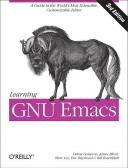Книга: Learning GNU Emacs, 3rd Edition
Acknowledgments
Acknowledgments
Debra Cameron: First, I would like to thank Duffy Craven for introducing me to Emacs. Second, I would like to thank my coauthors. Bill Rosenblatt was a tremendous help on the first edition of this book, and Eric Raymond worked with blinding speed and brilliance on the second, providing some input on the third as well. I would especially like to thank my coauthors Jim Elliott and Marc Loy, without whom, in all honesty, this third edition would never have been finished. Their constant encouragement, support, and hard work helped make this edition a reality. I would like to thank all the readers who wrote in with their suggestions, especially Russell Harris, Seema Kumar, and Hui Oulan. I would also like to thank Eric Pement, who pointed me to the very interesting TEI Emacs add-on, as well as the authors of that extended environment for Emacs, including Sebastian Rahtz and Syd Bauman. Personally, I would like to thank my husband Jim and my kids Meg, David, Beth, and Kevin for their patience and help during the revision of this book and also my friends Irene and Jacki for their support. Most of all, I would like to thank all the developers and hackers who continue to make GNU Emacs the most amazing piece of software I have ever worked with.
James Elliott: I have to thank Deb for asking me to help people learn about Emacs. I've long admired (and relied on) the editor and its ever-growing ecosystem of tools and extensions, as well as the philosophy and results of the Free Software Foundation. They represent a distillation of what makes computing an interesting and valuable field for me, and I am honored to be part of this project. Ironically, I have to also thank Deb for letting me take a big chunk of time off when my Hibernate book came into being.
Thanks are also due to Marc, both for initially introducing me to the fine folks at O'Reilly and for his help and input on this book. He ended up contributing more than he signed up for when I got pulled away in the middle. Nor should I forget my fine colleagues at GE's Corporate Research and Development Center in Niskayuna, New York who first introduced me to the mysteries of Emacs as an intern there. I'm indebted to Joe for his love and support. And let's hear it for the cast of thousands who have grown Emacs into what it is today!
Marc Loy: I have the occasionally lazy—no, let's say overworked—staff at the University of Southern California's computer labs to thank for getting me started on Emacs. They were out of vi cheat sheets when I sat down to write my first computer program. (I won't admit to the language I had to use.) I've been grateful for that happenstance ever since. I'd also like to thank Jim and Deb for their cheery outlook on things as we finished up this latest edition. As always, my sister Amy and my partner Ron remain constant forces for good in my world and make all the silliness (like politics) surrounding the fun stuff (like writing about Emacs) tolerable.
Eric Raymond: My thanks go first to the hacker community at large, all the people who created the rich tradition of Emacs Lisp programming that takes Emacs customization from elegant theoretical possibility to practical tool. I learned what I know partly from reading code written by the likes of Olin Shivers, Jamie Zawinski, Kyle Jones, Barry Warsaw, Roland McGrath, Richard Stallman himself (of course), and many others. Secondly, my thanks and warmest love go as always to my wife Catherine, who supported me on many levels while I worked on my bits of this book. Finally, my thanks and respect to the hip, professional, and clueful people at O'Reilly. They know how to produce a good book and how to treat an author right. They care, and it shows.
Bill Rosenblatt: I would like to thank the following people: Professor Richard Martin (Princeton Classics Department), for planting the seed in me that eventually turned writing from a chore to a pleasure; Intermetrics, Inc., for giving me little enough to do that I could fritter away my workdays delving into GNU Emacs; Hal Stern, for getting me this gig; Sandy Wise, for his help; Jessica Lustig, for her love and support; and most importantly, my grad-school housemates for putting up with a tied-up phone line at all hours of the day and night.




